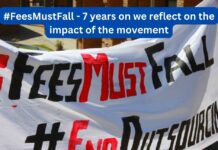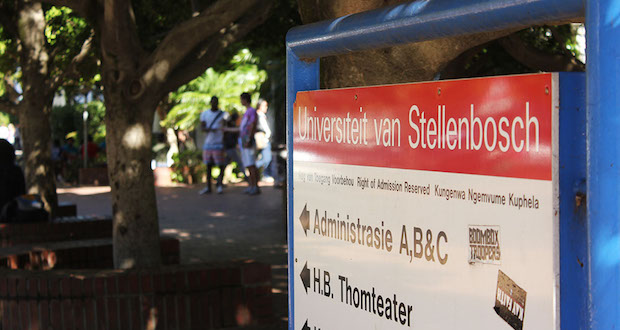Adam Habib recently penned an open letter to academics concerned about security measures taken at Wits University over the past week. HEINRICH BÖHMKE reminds us of Habib’s own history of being involved in student protests. Does forgetting Habib’s past as a student activist help him to repress protest action as a university administrator?Â
Wits University vice chancellor, Adam Habib aims a combination of blows against the militant minority of students and staff who disrupt the 2016 academic registration, ostensibly pursuing revolution.
In justifying the presence on campus of private security, he rocks #FeesMustFall back on their heels for their insensitivity to the plight of poor students. Poor students came from far and wide, typically to register in person, only to be turned away by protesters. On the use of violence, he pummels #FMF with their violation of the rights of others, asking whether tactics invoking force can at all be considered legitimate under democracy and at a university. Private security is thus necessary to thwart the infusion of current struggles with an all too fashionable violence, fetishised mainly by middle-class professors with no idea of its social costs.
ALSO READ: The letter from academics that got Habib writing backÂ
I find myself in Habib’s corner when he hints at the existence of less desirable agendas animating some university agitators; such as local government elections or an antipathy to Zuma. Perhaps he does not go far enough. Were I in the ring, I might have added political and economic naiveté, far-sighted careerism, factional competition, teenage excitability and delusions of grandeur. On the part of some, but by no means all academic staff supporting #FeesMustFall, I’d add a severe case of radical chic. I stand up and cheer Habib as he questions the racial essentialism underlying the trash-talking in which his opponents so frequently engage. I also admire the way he moves in the ring, punching from behind the defence of his own struggle credentials.
In siding with him though, I also lash out at myself. In 1995 I was expelled from Wits for protesting in favour of “transformation”. We spilled litter, occupied offices and made a bloody nuisance of ourselves. I won’t debate the differences in content and form between old and new struggles. The similarities are sufficient for me to feel quite queasy at who my new champion is. It’s nauseating that I beat up on and abandon to his fate that young, idealistic but also reckless and intemperate young man I once was, by doing the same to the generation afterwards.
While it is tempting to ascribe a change in one’s politics to gaining wisdom and embracing an ethics of common decency, there is something about Habib’s new stance that he (and I) should not be permitted to dodge. Yes, we may now invoke as universal the liberal values of freedom of association, lawful protest and democratic process as the most appropriate drivers of social change. Yes, we may seek to protect the increasingly fragile institutions of higher learning from the convenient anger of woke Bikoist chisboys. I join Habib, even if only from the sidelines, in the fear that the chaos of what goes for “the revolution” these days will overwhelm us all, including the poor, for the far worse.
However, in the midst of our recantations of the strategies and tactics of the past, the boycotts, sit-ins, insults, threats, blockades, class disruptions and various acts of klipgooiery, we must also acknowledge that something else informs our current occupation of the blue-corner. The prize-fighter fights for a paycheque.
Before being enrobed as a VC himself, Habib participated in campaigns at the University of Durban-Westville (UDW) that saw the unseating of a rector with the institution closed for a number of weeks. This struggle had many flaws, including some serious ones Habib has identified. As a participant myself, I think back in horror at how we dealt with “conservative” critics of our plans. But the analysis of society that drove the UDW struggles was proven correct. Long before it was fashionable to do so, calls for curriculum change, against baaskap, Gear (government’s Growth, Employment and Redistribution policy), privatisation and government corruption were loudly made.
If UDW as an institution was put at risk, student and staff protests were certainly a factor. However, it is unfortunate that Habib does not acknowledge that UDW’s decline had more to do with government interference and underfunding, its moral tone undermined more by the mistreatment of African workers by labour brokers than by toyi-toyis. The deployment of divisive, government-minded VCs dented its academic credentials in the long run far more than having strong trade unions.
I get the impression from Habib’s mea culpa that it was the actions of staff and students that were the original wrong and not the severe repression brought down on those trying, by and large, for just and reasonable outcomes.  Long after the troublemakers he alludes to left the university, repression at UDW continued, ending in the death of a student on campus at the hands of police. I wonder why on earth he spends so much space in his letter denouncing troublemakers and not the enduring repression?
Adam Habib benefitted from his profile as a vociferous anti-Gear critic, garnered while at UDW.  Many saw him as a brave and somewhat persecuted fighter against racism, privatisation and economic exclusion. His next job was to direct the Centre for Civil Society which, in its own way, facilitated social protest – Not all of it lawful, or perfectly respectful of the rights of others either.  This is not to deny that Habib’s intellectual calibre would have got him up the greasy pole of academic promotion anyway. But it did him no harm that he was for years the go-to person on social protests in South Africa, often providing comments supportive of these struggles, many of them disruptive and illegal.  Now at his apex, (besides as minister of education, it is hard to see where a promotion for Habib lies), his sympathies for disruption and illegality have considerably cooled and his exertions on behalf of class compromise considerably heightened. And good for him.
But what is missing from Adam’s narrative, in which he distances himself from selected parts of his activist past, is the admission that his present job description is to interdict disruptive conduct at Wits. He must induce compromise with resources like beefy private security guards. His missive is thus ultimately not an intellectual but a professional intervention.
Since Habib presents an intellectual argument, is it too much to expect a theoretical concession from the remnant political scientist in him? This would be  that his bringing muscle onto campus is not solely produced by distancing himself from his own disreputable past but also produced by an embrace of his presently refurnished VC lodgings, his ascent into the strata of the wealthy, the delights of executive authority, and the hopes that he will pass on his present advantage to the next generation? Recanting his past is the moral argument for how Adam Habib can now punch the “revolutionaries” (deserving as they may be) so hard. Embracing his present class and perhaps even race consciousness is the other side of the fist.
The worrying thing that I take away from the history of so many leftist poachers who turn institutional gamekeepers, (and I include myself in this as a person often facilitating the dismissal of employees), is that the ability to be cast as wise, compromising, unselfish, just, seeing the big picture and protecting universal principles resides with the already rich and powerful. The poor are either victims to be protected by us, or nasty grasping revolutionaries (like #FMF) to be strictly policed.
Until, in time, those who make it also recant.


![Project Hoopoe Habib evolution [slider]](https://www.thedailyvox.co.za/wp-content/uploads/2015/09/Project-Hoopoe-Habib-evolution-e1453202715775.jpg)







